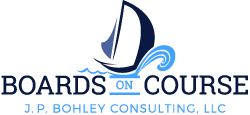Tip #86 Sample Agenda for Impactful Board Meetings
The following board meeting agenda is a sample agenda for a board that uses the Policy Governance® model of board operations. However, even boards not using this model may find in this sample agenda ideas that can make their board meetings more impactful. By impactful, I mean board meetings that provide clear thoughtful direction to the CEO about the board’s expectations for management and that ensure that those expectations are being complied with.
Such board expectations include organizational purpose (what results or benefits the organization is to produce and for whom) and standards to be complied with regarding the prudent and ethical performance of the organization. In other words, impactful board meetings enable the board to ensure that the organization is achieving its board-determined purpose while operating prudently and ethically.
Sample Board Meeting Agenda
1. Call to Order
2. Approval of Minutes of Previous Board Meeting
3. Board Monitoring of its Own Performance
a. Review of Board Members’ Feedback regarding the Last Board Meeting (For example, a brief questionnaire could be filled out by board members at the end of each board meeting with the results collated and summarized by an assigned board member or staff member for discussion at the next board meeting. For a sample questionnaire, please click https://www.BoardsOnCourse.com/resources.)
b. Assessment of Board Compliance with Selected Board Policies that Define the Boards’ Expectations for Itself (For example, the board could have a schedule for reviewing all such policies over a period of two years to include policies such as Governance Style, Board Member Code of Conduct, Board Agenda Planning, Board Committees, Board Delegation to the CEO, Monitoring of CEO Performance, etc.)
4. Board Monitoring of Organizational Performance
a. Assessment of CEO/Organizational Compliance with Selected Board Policies regarding Organizational Purpose and/or Organizational Operations (For example, the board could have a schedule for reviewing monitoring reports for all such board policies. The board might review Organizational Purpose (Ends) once a year, financial performance quarterly or even more frequently, and other board operational policies annually or every two years. Note that board policies about operations are different from management’s policies about operations. Board policies about operations set the parameters within which management is authorized to make operational decisions including developing its own operational level policies and procedures.)
5. Report of Chief Executive regarding Operational Matters (The chief executive can report on matters of interest to board members. To limit time spent on operational matters delegated to the CEO, the CEO could provide this report via email prior to the board meeting.)
6. Required Approvals Agenda (This is a listing of agenda items of matters delegated by the board to the CEO but for which one or more external authorities require an official board approval.)
7. Communication with Key Organizational Stakeholders (“Owners”) (This can include identification of those key stakeholders on whose behalf the board governs and to whom it sees itself as accountable. Plans can be developed for communication with this group as a whole, perhaps via a survey, and with subgroups of the larger group, perhaps via community meetings, board meeting discussions, focus groups, key person interviews, etc. After such communication activities occur, board meeting discussion can focus on what’s been learned from such communications and the implications of these learnings for board considerations relating to organization purpose.)
8. Board Education (as background for future board decisions especially related to organizational purpose; perhaps, discussion of a relevant journal/magazine article, presentation by experts on community needs, social trends, industry trends, future projections, etc.)
9. Organizational Purpose Policy (Ends Policy) (Develop and/or refine board policy statement of organizational purpose perhaps annually.)
10. Public Open Forum (for the board of a public/governmental agency)
11. Board Member Open Forum: Board Member Concerns/Interests
12. Adjournment
Note: board meeting agenda items can relate to any board job: ongoing board communication with key stakeholders, board policy development/refinement (policies articulate board expectations for management and for itself), assurance of compliance with board policy, other board jobs identified by the board such as fund raising, legislative advocacy, etc.
The Policy Governance® model provides a comprehensive design for efficient impactful board operations. To learn more about the Policy Governance® model, please click https://www.BoardsOnCourse.com/policy-governance.
